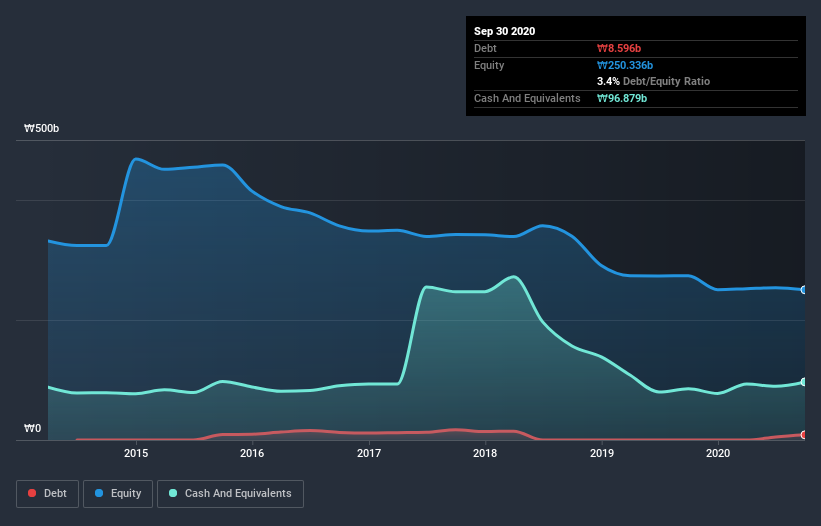Legendary fund manager Li Lu (who Charlie Munger backed) once said, 'The biggest investment risk is not the volatility of prices, but whether you will suffer a permanent loss of capital.' When we think about how risky a company is, we always like to look at its use of debt, since debt overload can lead to ruin. We can see that Wemade Co.,Ltd. (KOSDAQ:112040) does use debt in its business. But the more important question is: how much risk is that debt creating?
Why Does Debt Bring Risk?
Debt and other liabilities become risky for a business when it cannot easily fulfill those obligations, either with free cash flow or by raising capital at an attractive price. In the worst case scenario, a company can go bankrupt if it cannot pay its creditors. However, a more common (but still painful) scenario is that it has to raise new equity capital at a low price, thus permanently diluting shareholders. Of course, plenty of companies use debt to fund growth, without any negative consequences. When we examine debt levels, we first consider both cash and debt levels, together.
See our latest analysis for WemadeLtd
What Is WemadeLtd's Net Debt?
You can click the graphic below for the historical numbers, but it shows that as of September 2020 WemadeLtd had ₩8.60b of debt, an increase on none, over one year. However, it does have ₩96.9b in cash offsetting this, leading to net cash of ₩88.3b.

How Healthy Is WemadeLtd's Balance Sheet?
We can see from the most recent balance sheet that WemadeLtd had liabilities of ₩57.3b falling due within a year, and liabilities of ₩644.4m due beyond that. On the other hand, it had cash of ₩96.9b and ₩45.9b worth of receivables due within a year. So it can boast ₩84.8b more liquid assets than total liabilities.
This surplus suggests that WemadeLtd has a conservative balance sheet, and could probably eliminate its debt without much difficulty. Simply put, the fact that WemadeLtd has more cash than debt is arguably a good indication that it can manage its debt safely. When analysing debt levels, the balance sheet is the obvious place to start. But it is future earnings, more than anything, that will determine WemadeLtd's ability to maintain a healthy balance sheet going forward. So if you want to see what the professionals think, you might find this free report on analyst profit forecasts to be interesting.
Over 12 months, WemadeLtd made a loss at the EBIT level, and saw its revenue drop to ₩104b, which is a fall of 15%. That's not what we would hope to see.
So How Risky Is WemadeLtd?
Statistically speaking companies that lose money are riskier than those that make money. And in the last year WemadeLtd had an earnings before interest and tax (EBIT) loss, truth be told. Indeed, in that time it burnt through ₩12b of cash and made a loss of ₩16b. Given it only has net cash of ₩88.3b, the company may need to raise more capital if it doesn't reach break-even soon. Overall, its balance sheet doesn't seem overly risky, at the moment, but we're always cautious until we see the positive free cash flow. There's no doubt that we learn most about debt from the balance sheet. But ultimately, every company can contain risks that exist outside of the balance sheet. Case in point: We've spotted 1 warning sign for WemadeLtd you should be aware of.
If you're interested in investing in businesses that can grow profits without the burden of debt, then check out this free list of growing businesses that have net cash on the balance sheet.
If you’re looking to trade WemadeLtd, open an account with the lowest-cost* platform trusted by professionals, Interactive Brokers. Their clients from over 200 countries and territories trade stocks, options, futures, forex, bonds and funds worldwide from a single integrated account. Promoted
Valuation is complex, but we're here to simplify it.
Discover if WemadeLtd might be undervalued or overvalued with our detailed analysis, featuring fair value estimates, potential risks, dividends, insider trades, and its financial condition.
Access Free AnalysisThis article by Simply Wall St is general in nature. It does not constitute a recommendation to buy or sell any stock, and does not take account of your objectives, or your financial situation. We aim to bring you long-term focused analysis driven by fundamental data. Note that our analysis may not factor in the latest price-sensitive company announcements or qualitative material. Simply Wall St has no position in any stocks mentioned.
*Interactive Brokers Rated Lowest Cost Broker by StockBrokers.com Annual Online Review 2020
Have feedback on this article? Concerned about the content? Get in touch with us directly. Alternatively, email editorial-team (at) simplywallst.com.
About KOSDAQ:A112040
WemadeLtd
Develops and publishes games in South Korea and internationally.
Very undervalued with proven track record.
Market Insights
Community Narratives



